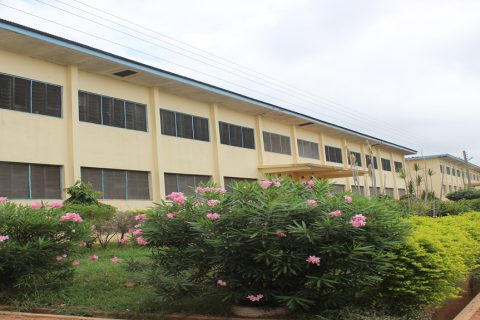
SCIENCE DEPARTMENT
Introduction
In the modern world, pursuing a science course in senior high school opens up a wide array of job opportunities across various industries. Students who have a keen interest in science subjects have the potential to explore diverse career paths that align with their passion for scientific inquiry and discovery. This report aims to highlight some of the promising job opportunities available for students who choose to pursue a science course in senior high school.
CAREER OPTIONS FOR SCIENCE STUDENTS
Physics, Biology, Chemistry, and Elective Mathematics:
Medical Research Scientist: Conduct research to understand biological processes, develop new drugs, and improve healthcare.
Biotechnologist: Apply principles of biology and chemistry to develop products and technologies for various industries, such as pharmaceuticals and agriculture.
Data Analyst: Utilize mathematical and statistical skills to analyse complex datasets, often in fields like healthcare or environmental science.
Physics, ICT (Information and Communication Technology), and Chemistry:
Software Engineer: Develop software applications and systems, utilizing knowledge of physics and chemistry in fields such as simulations or computational chemistry.
Network Administrator: Manage and maintain computer networks, applying ICT skills to ensure efficient communication and data transfer.
Chemical Informatics Specialist: Use ICT tools to analyse and interpret chemical data, supporting research and development in industries like pharmaceuticals or materials science.
Physics, Chemistry, and General Agriculture/Crop Husbandry/Animal Husbandry:
Agricultural Scientist: Conduct research to improve agricultural practices, develop new crop varieties, and enhance food production.
Environmental Consultant: Assess environmental impact of agricultural practices, providing recommendations for sustainable farming methods.
Chemical Engineer (in Agricultural Industry): Apply principles of physics and chemistry to design processes for fertilizer production, pesticide development, or food processing in agriculture.
Physics, Chemistry, Elective Mathematics, and Geography:
Studying physics, chemistry, elective mathematics, and geography can lead to careers in research, academia, engineering, technology development, urban planning, environmental management, and GIS analysis. These fields provide a strong foundation for understanding natural phenomena, analysing spatial data, and solving complex problems across diverse industries.
Physics: Physics encompasses the study of matter, energy, and the fundamental forces governing the universe. Individuals with expertise in physics can pursue careers in research, academia, engineering, and technology development. From astrophysics to quantum mechanics, the field offers numerous avenues for exploration and innovation.
Chemistry: Chemistry focuses on the composition, structure, properties, and reactions of matter. Graduates in chemistry can find employment in industries such as pharmaceuticals, biotechnology, materials science, and environmental conservation. Careers range from chemical engineering to forensic science, offering opportunities for both practical application and theoretical research.
Elective Mathematics: Elective mathematics, often including advanced topics like calculus, linear algebra, and statistics, provides a strong analytical foundation applicable across various fields. Proficiency in mathematics is highly sought after in industries such as finance, data science, engineering, and computer programming. Mathematicians play crucial roles in modeling complex systems, optimizing processes, and developing algorithms for diverse applications.
Geography: Geography involves the study of Earth’s landscapes, environments, and spatial relationships. Graduates in geography can pursue careers in urban planning, environmental management, GIS (Geographic Information Systems) analysis, and cartography. Understanding spatial patterns and processes is essential for addressing contemporary challenges such as climate change, resource management, and urbanization.
ICT (Information and Communication Technology): The ICT sector is rapidly evolving, offering a wide range of career opportunities for individuals with skills in computer science, programming, networking, and data analysis. Graduates in ICT can pursue careers as software developers, data scientists, IT consultants, cybersecurity specialists, and systems analysts. The demand for ICT professionals continues to grow as organizations increasingly rely on technology to streamline operations and drive innovation.
AGRICULTURE SCIENCE
General Agriculture, Crop Husbandry, and Animal Husbandry:
Agriculture remains a vital sector of the global economy, providing food, fiber, and fuel for the world’s population. Individuals studying general agriculture, crop husbandry, and animal husbandry can pursue careers as agricultural scientists, agronomists, farm managers, livestock specialists, agricultural extension officers, and agribusiness entrepreneurs. With the growing emphasis on sustainable agriculture and food security, there is a need for skilled professionals to address challenges related to climate change, soil health, pest management, and livestock welfare.
- Chemistry, Physics/Elective Mathematics, Crop Husbandry, and General Agriculture:
Agronomist: Apply knowledge of chemistry and physics to study soil, crops, and agricultural systems, aiming to optimize crop production and sustainability.
Soil Scientist: Investigate the chemical and physical properties of soil to improve soil management practices and enhance agricultural productivity.
Crop Scientist: Conduct research to develop new crop varieties, improve crop resilience, and maximize yield using principles from chemistry and physics.
- Chemistry, Physics/Elective Mathematics, General Agriculture, and Animal Husbandry
Livestock Nutritionist: Utilize knowledge of chemistry and animal physiology to formulate balanced diets for livestock, optimizing their health and productivity.
Animal Scientist: Study animal behaviour, genetics, and physiology to improve breeding programs, animal welfare, and productivity in agriculture.
Agricultural Engineer: Apply principles of physics and mathematics to design and develop equipment and structures for both crop and livestock production systems.
Career Opportunities in Agriculture Science:
- Agricultural Extension Officer: Agricultural extension officers work with farmers to provide technical advice on best farming practices, new technologies, and government programs aimed at improving agricultural productivity.
- Agribusiness Manager: Agribusiness managers oversee the business operations of agricultural enterprises such as farms, food processing companies, agricultural supply chains, or agrochemical firms.
- Environmental Consultant: Environmental consultants specializing in agriculture work with farmers and agribusinesses to develop sustainable farming practices that minimize environmental impact while maximizing productivity.



